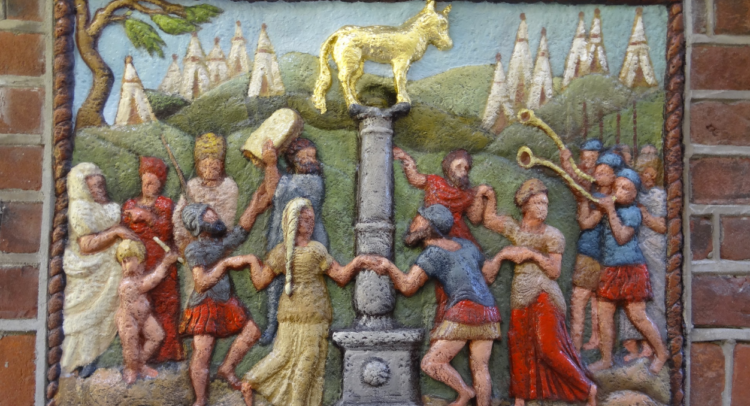Raboyseyee and Ladies,
The heylige Ois and eishes chayil are just back from Miami and are mamish excited to join our friends of many decades, Yohana and Robbie Herskowitz -in about one hour- for the wedding of their beautiful daughter Daniella who will be marrying Isaac Inkeles, he the son of Dr. and Mrs. Barton Inkeles, they of New York City. We are excited to participate. A special mazel tov shout out to Yohana’s parents, Mr. and Mrs. Joseph and Lieve Guttmann, to Robbie’s mom, Mrs. Judy Herskowitz and to the entire extended Guttmann and Herskowitz families. May Daniella and Isaac be blessed with decades of peace and harmony.
This coming motzei Shabbis we look forward to joining the Goldberg and Hack and Goldberg families as they celebrate the engagement of their children, Samantha and Jonathan. A big mazel tov to Susan and Eric Hack and to Leora and Neal Goldberg and to both extended families. Both bride and groom to be to -as in chosson and kallah- have spent much time in our home during their formative years and it so happens that the happy couple were introduced by our own daughter Mollie. Great work Mollie! Mazel tov and may Samantha and Jonathan merit to enjoy many decades of blissful marriage.
And this coming Sunday we look forward to participating in the wedding of Alexandra Winter, she the beautiful daughter of Alyssa and Chaim Winter. Alex will be marrying Benjamin Taragin, he the son of Hope and David Taragin. The eishes chayil and I look forward to joining you. Mazel tov wishes to both extended families.
Erotic Dancing & the Golden Calf
Fantastic news for my readers with mild or even severe ADD. This week’s parsha of Ki Sisa contains a little bit of everything, something for everyone. It’s mamish loaded with amazing storylines including the never fully forgiven sin of the golden calf. More on that below. According to some, every time the RBSO punishes the Yiddin -He does so with regularity- it’s still partly because of this sin. Nu, for those who don’t believe the RBSO has a feminine side, here is proof otherwise. Does your wife forget anything you’ve ever done wrong? Not mine, and case closed!
Ki Sisa includes a census count of the Yiddin, spices, incense, one of many reminders in the heylige Toirah regarding shabbis observance, the above mentioned eygel incident (golden calf), the breaking of the old and the new replacement luchis (second set of Tablets), the near destruction of the Yiddin, Moishe’s davening, the RBSO’s 13 special attributes of mercy, forgiveness, Yom Kippur in March, and much more. It is all here in the heylige Toirah. Halt kup and pay attention and you too will conclude that ‘Toirah is de beste schoira!’ Ober where to start and what to cover in a few pages? Shoin, let’s zero in on our headline erotic dancing and see what role it played in our parsha. We begin with the dramatic events of posik 10 in perek 32. Says the heylige Toirah, azoy:
וַיְהִי כַּאֲשֶׁר קָרַב אֶל הַמַּחֲנֶה וַיַּרְא אֶת הָעֵגֶל וּמְחֹלֹת וַיִּחַר אַף מֹשֶׁה וַיַּשְׁלֵךְ מידו [מִיָּדָיו] אֶת הַלֻּחֹת וַיְשַׁבֵּר אֹתָם תַּחַת הָהָר.
“As soon as Moishe came near the camp and saw the calf and the dancing, he became enraged; and he hurled the tables from his hands and shattered them at the foot of the mount.”
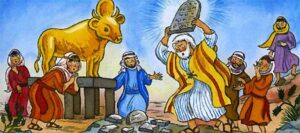
When Moishe came down from of the mountain after receiving the luchis (the tablets containing the Decalogue), he witnessed the Yiddin celebrating a festival featuring the golden calf. Seeing this with his own eyes, Moishe threw down the tablets and shattered them. And the questions we have include these: why did Moishe shatter the luchis at this point? Was he taken by surprise? Not! Isn’t it emes that prior to his descent form the mountain, that the RBSO had already told Moishe what was going on below? It is! Moishe was fully informed. Let’s read the relevant posik innavenyig. Says the heylige Toirah (Shmois 32:8) azoy:
עָשׂוּ לָהֶם עֵגֶל מַסֵּכָה וַיִּשְׁתַּחֲווּ לוֹ וַיִּזְבְּחוּ לוֹ וַיֹּאמְרוּ אֵלֶּה אֱלֹהֶיךָ יִשְׂרָאֵל אֲשֶׁר הֶעֱלוּךָ מֵאֶרֶץ מִצְרָיִם.
“They have made themselves a molten calf and bowed low to it and sacrificed to it, saying: ‘This is your god, O Israel, who brought you out of the land of Egypt!”
Moishe was clearly in the know. Ober, did he react? Did he break anything? Not! Vus epes now? Avada, this question has been hotly debated by a number of traditional exegetes. The bottom line: though Moishe was fully informed on what was going on below, he nevertheless took the luchis and began his descent. He was, therefore -seemingly and apparently- of the opinion that the making of the eygel (calf) was not a critical impediment to the Yiddin receiving them. Oib azoy (that being the case), why did he break them only upon seeing the eygel with his own eyes? If he felt that the people were not deserving, he should have left the them on the mountain! Or, perhaps he should have broken them on the spot. Says the Seforno, azoy: Moishe was taka informed by the RBSO that the people had made the Golden Calf. The posik reads: “They have strayed quickly from the path that I have commanded them; they have made for themselves a molten calf.” Moishe was thus already aware that the people had sinned. However, he reasoned that, as grievous as their sin might have been, they could recover from it by him bringing down the tablets. Perhaps their sin was born out of a moment of confusion, or lack of direction over Moishe not being among them. He reasoned that as soon as they would see the luchis, they would snap out of it and be reminded of the correct path for them to be taking. This is why Moishe took the luchis with him. Oib azoy (if this was the case), why did he break them?
Was he enraged? Did Moishe, leader of the Yiddin lose his temper? Was he out of control? And taka so says the RambaN (Devorim 9:17): “Moishe did not hesitate to break them because his anger was roused at the sight of their evil conduct. He could not control himself…” “When I saw you dancing in front of the calf, I could not control myself and I broke the tablets…” Moishe saw the revelry around the calf and could not contain his fury. Revelry? After all, this was a nation that he had led and trusted. He was incensed at the breach of the covenant. This was an instinctive emotional response.
And adds the Rashbam azoy: the sight of the Yiddin partying hearty around the eygel shocked him and his physical strength suddenly failed him: When he beheld the calf, all his vitality ebbed away from him and he just managed to push the tablets far enough away so as not to fall on his feet, like a person for who the burden becomes too much.
Other commentators suggest that Moishe was more controlled, and that he smashed the Tablets in a manner planned to shock the Yiddin, and make them understand the severity of their actions. Says the Netziv azoy: The text describes how Moishe took the calf and burned it and no man resisted him, whereas they had previously pressed Aharoin to make it. This was because Moishe, with deep psychological insight, resolved not to break the luchis on the mount when the RBSO initially informed him of the nation’s sin…., but decided to do it when his actions would make the greatest impact upon them, breaking the nation’s heart, and grieving them when they witnessed Moishe smashing this unique treasure before their eyes. Was Moishe using this moment end experience as a teaching lesson? Perhaps.
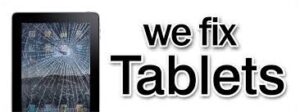
Says the Ibn Ezra, in a spirit of zeal for the RBSO, Moishe, smashed the tablets which constituted a legal certificate; he ripped up the betrothal document in the sight of all Israel.” Smashing the tablets was the most vivid way to communicate this realization. Smashing the tablets at the “foot of the mountain,” among the people, at the very location in which the nation had heard the words of G-d, would have driven home a powerful message that their earlier commitments were nullified, and that the covenantal relationship torn asunder. The marriage was over.
Ober, why did he wait so long? Did Moishe not believe what the RBSO told him? Say it’s not so please. Or was pshat azoy: of-course he believed, ober the matter was not yet engraved on his heart. He could not fathom the nation guilty of such treason. It’s one thing to believe what the RBSO told him in plain Hebrew, it is another thing to be prepared to shatter the luchis as a result of this belief. Seeing the sin in its complete depravity demonstrated to Moishe that the nation was seriously morally impaired. Seeing is believing!
Says Rashi that Moishe was motivated to shatter the luchis by a kal v’chomer (lenient and strict argument -otherwise known as the a fortiori argument- whereby we derive one law from the other, applying the logic that, if a case which is generally strict has a particular leniency, a case which is generally lenient will certainly have that leniency). Moishe reasoned, “If Pesach, which is only one mitzvah, does not permit a ben neichar (one who is strange to Jewish law), to partake of it, certainly one who rejects the heylige Toirah, the entire corpus of Jewish law and observance, does not deserve the luchis.” According to this pshat, Moishe applied analytical reasoning to deduce that shattering the luchis was not only correct- it was mandatory
What really happened? Let us set the scene when Moishe arrived at basecamp. When he approached, he saw the eygel calf, which he had been told about, but he also saw something else that he had not been aware of. The posik (Shmois 32:19) reads azoy:
“It happened as he drew near the camp, he saw the calf and the dances, and Moishe became angry, he threw the tablets down from his hands and shattered them at the foot of the mountain.”
He saw the what? And the what? The dances? Moishe had only been told -by the RBSO- that the people had made a calf. What he seemingly was not told and what he did not know, was that having made the eygel, they then proceeded to dance around it. This represented a completely different level of identification with their sin. The Yiddin did not believe they made a mistake. They were happy with it! The bottom line: witnessing the dancing brought Moishe over the top! At this point, he realized that merely seeing the luchis would not have any effect on the people; they were too far gone. They were fully invested in their path of sin; with the dancing in full swing, they may not even have noticed Moishe or the tablets! The only course of action that could bring them back was to smash the tablets in front of them. Drop the mic! The shock would cause the Yiddin to be confronted with a drastic expression of how far they had strayed and what they potentially stood to lose. Who knew that dancing could cause such problems? Ober was there something special about this dance? We shall address this question below, but first, let us first check out what a few other shad to say about Moishe’s reaction.
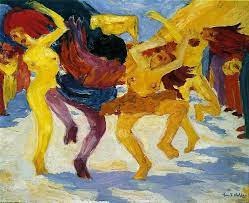
Why did Moishe Shatter the Tablets? Says the medrish (Medrish Shemois Rabah 43:1), azoy: What did Moishe do? He took the luchis from the hand of the Holy One, blessed be He, in order to calm His anger. To what is this compared? To a king who sent someone to betroth a woman through a shadchan (middleman). She went and acted inappropriately with another man. The middleman, who was innocent, what did he do? He took the kesuvah (marriage contract) which the king gave him to betroth her and tore it. His intention being that it is better she is judged as an unmarried woman than a woman who is married. What Moishe did was the same. When the Yiddin sinned, he took the luchis and broke them, so as to say that if they would have seen their punishment, they would have not sinned. Is that what happened?
Another medrish (Avos De-Rebee Noson chapter 2) tells us that Moishe looked at them and saw that the words had flown out and away. He said, “How can I give the Jewish people the luchis with no substance? Rather, I will grab them and break them.” Ober, let us check out the heylige Gemora (Shabbis 87a), where we find this: there were three things Moishe changed – three times when he went off script and on his own- from the directions given to him by the RBSO. Amongst the three, was the breaking of the luchis. Ober, did the RBSO agree with Moishe’s actions and activism? Who was Moishe to take the RBSO’s work and shatter them to smithereens? How do we know that the RBSO agreed with his judgment? Says the medrish that this phrase ״אֲשֶׁר שִׁבַּרְתּ these first tablets which you broke [asher shibarta]” (Shmois 34:1), and Reish Lakish said: The word asher is an allusion to the phrase: May your strength be true [yishar kochacho] due to the fact that you broke the tablets is meant to invoke the RBSO cheering Moishe’s breaking of the tablets. Mamish azoy? How are we to chap that the luchis – a once (ok, twice) in a universe creation with words inscribed by the RBSO’s own finger which Moishe broke and the heylige Gemora is suggesting that the RBSO says Yashar Koach, good on you Moishe, and well done? Ver veyst?
Says Rashi: For he was moved to smash the Tablets before their very eyes, as it is written (above, Deut. 9:17), “smashing them before your eyes,” and the Holy One, blessed be He, was of like mind with him, for it is written (Shmois 34:1), “which you shattered”—the more power to you (Yasher Koach!)
What really happened, ver veyst? Why taka did Moishe chose to break the luchis? Ver veyst. Was it the dance? Where the Yiddin involved is some form of dance that really angered Moishe? Were they caught mixed dancing? Or worse? What could be worse? Let’s find out. Let’s read the posik one more time: “As soon as Moishe came near the camp and saw the calf and the dancing, he became enraged; and he hurled the tables from his hands and shattered them at the foot of the mount.”
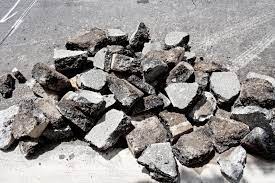
The posik specifically adds “dancing” to the information that Moishe already knew, and it was only when he came close to the camp that he witnessed it, and only then that he shattered the tablets. Ober, what was so giferlich with dancing, or more specifically, why is dancing worse than “just” worshipping the calf? Do we ever refer to the greatest sin as that of dancing or mixed dancing? Does the RBSO punish us continually because the Yiddin went mixed dancing? Was Moishe more bothered by the dancing than the worshiping? What’s pshat here?
Ober listen to this bombshell pshat: says the medrish that the terminology used in the posik implies that the Yiddin were involved in group sexual promiscuity. What? Say it’s not so, ober let us look at posik 6 where we read that “they rose to play (לצחק).”
וַיַּשְׁכִּ֙ימוּ֙ מִֽמׇּחֳרָ֔ת וַיַּעֲל֣וּ עֹלֹ֔ת וַיַּגִּ֖שׁוּ שְׁלָמִ֑ים וַיֵּ֤שֶׁב הָעָם֙ לֶֽאֱכֹ֣ל וְשָׁת֔וֹ וַיָּקֻ֖מוּ לְצַחֵֽק׃ {פ}
Early next day, the people offered up burnt offerings and brought sacrifices of well-being; they sat down to eat and drink, and then rose to dance.
What sayeth Rashi: it’s shreklich (horrifying) but let’s read it anyway: לצחק TO PLAY — There is implied in this term besides idolatry also sexual immorality, — as we find the word used in, (Bereishis 39:17) “to mock (לצחק) me” where unchastity is meant as is evident from the context…. The term “letzachake” -lit “play” ober also to “dance” has clear sexual overtones. It does? Let us also harken back to the good book of Bereishis (26:8) where we read how Avimelech looked through the window and saw Yitzchok “playing” with his wife Rivka and how he quickly deduced that they must be husband and wife. The bottom line: Moishe was seemingly ok when the RBSO informed him that the Yiddin were off the derech; he was not ok when he found out they were dancing erotically -meaning with sexual undertones- around and with this calf.
Says R. Shamshon Rafael Hirsch that the erotic dancing was what pushed Moishe to destroy the tablets.
“את העגל ומחֹלֹת” (שמ’ לב:יט). את “העגל” המיודע שכבר ידע עליו, “ומחֹלֹת” בלתי ידועים, כי נתחדשו עתה לעיניו, והן מחולות אורגיאסטיות של פריצות, והם שהביאו אותו לשבּר את הלוחות. לא רק טעייה תיאולוגית מצא בישראל, אלא גם שחיתות של פריצות שנתלוותה אליה.
The calf and dancing – “the calf” with the definite article, because he already knew about it; “dancing” without the definite article, since he did not know about it, for he only learned about it first with his own eyes. These were orgiastic or lewd dances. Witnessing them was what brought Moishe to smash the tablets, for now it wasn’t only a theological breakdown among the Israelites, but a lapse in sexual mores that came along with it. Orgiastic dancing? Well, blow me down!
The bottom lines of the eygel caper, the mixed happy dance and the shattering of the luchis are azoy: we all make mistakes, big and little ones; hopefully, none as big as the Eygel Hazahav (the Golden Calf). Because we don’t enjoy the feeling of having sinned and done something wrong, our egos allow us to justify them. By the time the ego has done its work, we have produced an elaborate and compelling thesis as to why our sins weren’t really that terrible; maybe they weren’t even sins at all. We dance around our mistakes, regarding them as nothingburgers, or even as mitzvis. When the time comes to consider how to correct them, an important question will be: are we dancing around them? Another bottom line: if we stop dancing around them, recovery is possible. The Yiddin -perhaps from the shock of seeing or hearing Moishe shatter the luchis- stopped dancing and were able to recover; they got a second chance. Sadly, they needed that one and many more in the ensuing 40 years. And many more chances ever since.
The final bottom line: there are times when our lives have spun so far out of control that we might be better off smashing all and reinventing ourselves. To that, the RBSO might just say ‘Yashar Koach ‘Asher shibarta;’ good job that you broke those bad behaviors and practices. The RBSO forgives.
A gittin Shabbis!
The Heylige Oisvorfer Ruv
Yitz Grossman
